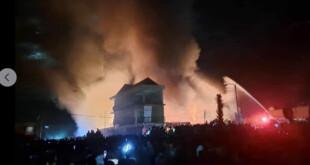Saudi Arabia, the Arab world’s biggest economy, is taking action against illegal workers as it pushes to create more jobs for its citizens and stave off unrest. The kingdom made job creation a priority after uprisings in 2011 toppled leaders across the Middle East.
Along al-Faryan Street in Manfouha on Sunday, hundreds of East Africans gathered around a traffic light, some sitting on stuffed suitcases, as Saudi police watched from outside their vehicles, which blocked the main intersection. Ambulances and buses were parked alongside the road.
The buses were being used to transport undocumented workers to centers for exit visa processing and deportation, al-Arabiya satellite television reported. Authorities have set up a place to house violators of the visa laws in Manfouha should they surrender voluntarily, the Saudi Press Agency said, citing another police statement.
“I am leaving today,” said Abdullah Ibrahim, a 25-year-old Ethiopian. “I don’t have a residency permit and need to leave.”
Girma Makonnen, fearing the crackdown and the violence, is also trying to depart after working in the kingdom for seven years.
The jobless rate for Saudi workers is about 12 percent, according to official figures, while economic growth is forecast to slow to 4.2 percent this year, from 5.1 percent last year and 8.6 percent in 2011, according to a Bloomberg survey of 20 analysts.
Saudi Arabia has attracted more than 9 million foreign workers, some of whom illegally cross the border from Yemen, as it invests its oil wealth to build roads, airports and new industrial cities. The kingdom of 29 million people was the third-biggest global provider of worker remittances after the United States and Russia, sending $29.5 billion in 2012, according to World Bank data.
In Manfouha, some shop signs are written in Amharic, the language spoken in Ethiopia, alongside Arabic. On the back streets, rundown buildings with plastic water tanks and old air conditioners stand next to lots with collapsed buildings. The neighborhood provides a sharp contrast to the glass office towers in other parts of the city.
A video posted on YouTube showed men beating someone with sticks and clubs during the crackdown and others running down a street in the neighborhood. Another video showed a convoy of police vehicles responding to the riots. The authenticity of the videos could not be verified.
The Saudi Press Agency did not identify the nationality of the second person killed in the clashes. Police shot and killed an Ethiopian man last week as he tried to grab a police officer’s weapon during a raid, the Jeddah-based Arab News newspaper reported Friday.
— Bloomberg News




